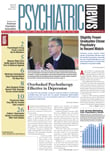During my Bellevue C/L training, I was asked to evaluate a classic alcoholic with DTs and chronic cardiac and renal disease. Besides being exuberantly paranoid and profane, the patient reeked of booze and body odor. "Why are we knocking ourselves out with this guy?" asked an annoyed intern, "He's just another bum." The chief resident angrily retorted: "There's no room for bum treatment in the treatment of bums!"
Several years ago, I criticized Tony Soprano's long-suffering therapist, Dr. Jennifer Melfi, for giving her badfella client the bum's rush as the HBO series ended. Melfi probably should never have taken on Tony in the first place for moral as well as legal reasons. But, as Al Capone said about the rackets, once you're in, you're in, and there's no getting out. At first hugely resistive, Tony had come to trust Melfi over several years, even benefit from her help. In this context, ejecting him from treatment was callous and unethical.
The third and last season of the HBO series "In Treatment" recently concluded with another therapeutic bum's rush. During the previous seasons, Dr. Paul Weston, a gifted but deeply flawed psychoanalyst, was treated by his former mentor, Gina. Their relationship was complex. Her interventions were sometimes questionable. She was guilty of several major boundary violations, as was Weston himself in his work. But Gina's respect of and concern for Weston seemed genuine. Although he left treatment with his doubts about the value of psychotherapy unresolved, he parted on warm terms with her.
I speculate that the creators of "In Treatment," in the context of flagging interest in the series, imagined that going deeper into Weston's neurotic conflicts would make for more gripping melodrama. Unfortunately, they converted their sympathetic wounded healer into an unappealing whiner, awash in maudlin self-pity. His work with his latest crop of patients—a depressed Indian ex-patriot, a famous actress who couldn't remember her lines, and a provocative gay adolescent—was more uneven than ever and compromised by his gnawing skepticism.
Weston returned to treatment yet again after discovering that Gina had painted a mean and recognizable portrait of him in a novel. This time around, he was careful to choose Adele, a brilliant young psychoanalyst with impeccable credentials, utterly incapable of Gina's countertransferential contretemps.
Adele quickly winkled out Weston's rescue fantasies, his overweening need to be needed, and his hidden sense of entitlement. She adroitly turned away—and interpreted—his clumsy proposition to take their relationship out of the office. But despite her finely honed skills, Adele was a Freudian ice queen. With all her avowals of sympathy, she was emotionally tone-deaf to his suffering.
Dr. Melfi whacked Tony Soprano out of therapy crudely—and uneasily. But Adele's bum's rush of Weston was so subtle, so well rationalized by her stringent obedience to ultraorthodox analytic principles as to go unrecognized by her. Weston suffered a narcissistic meltdown when he discovered Adele was pregnant. In their last session, his composure and dignity restored to something of his healthier self of the first two seasons, he asked her to reveal the circumstances of her pregnancy. Was she married? Living with someone? Or was there no father, rather insemination in the abstract?
Weston made it clear that he neither wanted nor needed many details about her private life. He just feared that her refusal to reveal the simple truth about her pregnancy would precipitate an interminable analysis of his fantasies about her, while more pressing issues in the real world would go unaddressed.
I believe his request deserved an answer. For the concluding season's immature and unmoored Weston has, at base, been an adolescent in an adult's body. To treat teenagers—and perennial adolescents like Weston—the therapist must share something, though not much, of his or her outside life. It's mightily therapeutic to know you are sharing your problems with a fully fleshed human being, and not some Rogerian robot.
Predictably, Adele remained as mum about her pregnancy as about the rest of her world. Although she rendered Weston more honest service than slippery Gina, her "appropriate" analytic stance is as cruel as Melfi's coarse rejection of Tony Soprano. Weston does well to flee Adele's juiceless care. Her parting words—"my door is always open to you"—go down as easy as oysters. Her smile is a pleasant rictus. Come back tomorrow and get more of the rigid, frigid same.
